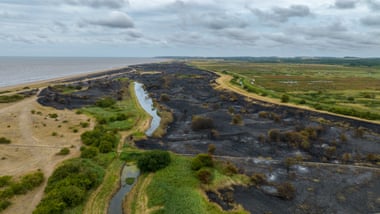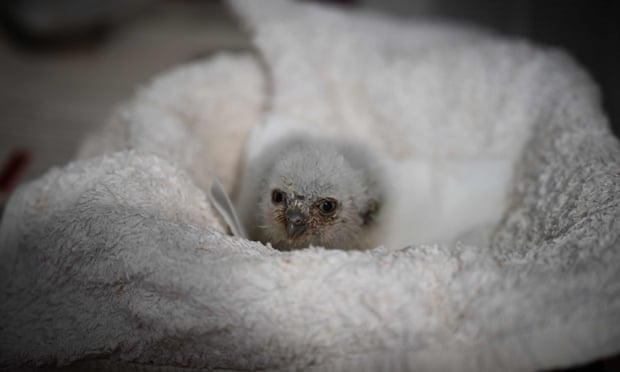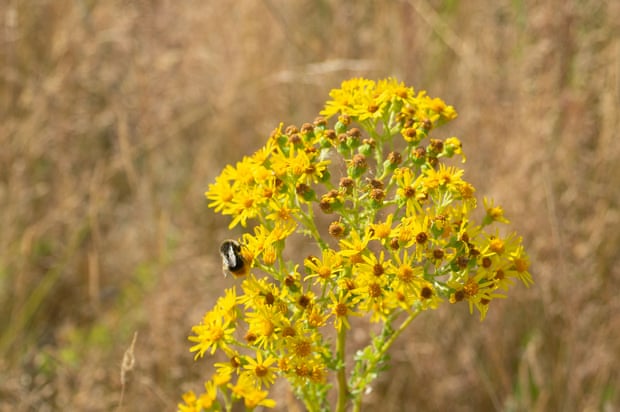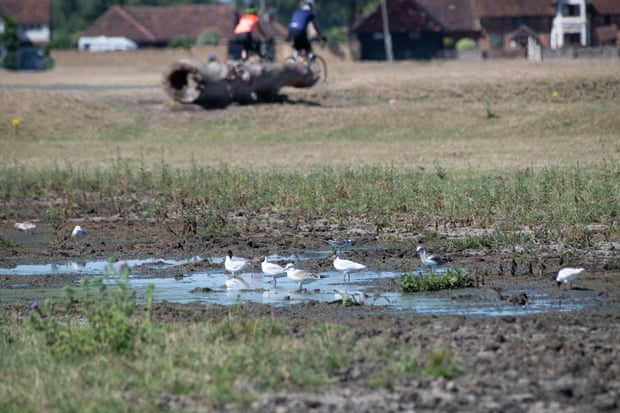Falling birds and dehydrated hedgehogs: heatwave takes its toll on UK natural world | Flora and fauna

Animal rescue centres gained a glut of calls, birds fell out of the sky and nature reserves burned as British natural world baked in closing week’s heatwave.
Conservationists mentioned animals have been eerily nonetheless as they attempted to refuge from the warmth. Professionals concern that record-breaking temperatures may motive an extra cave in in insect numbers, with bumblebees and butterflies amongst the ones most influenced.
Dehydrated hedgehogs, child birds, fox cubs and grass snakes have been one of the casualties helped via the RSPCA, which warned that the level of the wear from warmth rigidity within the 40C (104F) stipulations was once huge. “Our emergency name centre has many extra calls than standard. On Monday we gained 7,186 calls to our helpline in comparison to 4,416 on Sunday, which was once a large building up,” mentioned Evie Button, medical officer within the natural world division on the RSPCA.
There have been experiences of swifts falling out of the sky in London, and Oxfordshire Flora and fauna Rescue close to Didcot mentioned it will now not take any further animals after the heatwave greater the choice of casualties being introduced in. “Continuously you don’t see the affects of one thing like this at once for the reason that nature of natural world is to cover away after they’re unwell or injured,” mentioned Button. “It’s steadily most effective after they’re in a actually dangerous state that folks will see them and make contact with us. So numerous the have an effect on might be hidden.”

Some of the maximum dramatic occasions was once a wildfire in Norfolk’s Wild Ken Hill reserve, the place 33 hectares (82 acres) of thorny scrub went up in flames, with nesting territories of turtle doves, grasshopper warblers and reed warblers destroyed. Reptiles and amphibians would have burned, whilst maximum birds would have escaped – except for the ones nesting overdue within the season,mavens mentioned. “I noticed some birds flying again into the flames. I believe the maternal intuition is rather robust,” mentioned venture supervisor Dominic Buscall. “I’m fascinated with it going down once more this 12 months. It’s extremely dry, we haven’t any rain forecast this week and it’s most effective mid-July,” he added.
What is occurring in the United Kingdom is a part of a larger image, with heatwaves changing into extra commonplace because the local weather disaster escalates. Throughout Europe previously few days land was once scorched and there have been fires in quite a few international locations together with Spain, Greece and France. With heatwaves projected to turn into 12 instances extra widespread via 2040 in comparison to pre-warming ranges, animals the world over are converting their behaviour to manage. As an example, analysis displays grizzly bears in Alberta, Canada, search for extra closed, shaded crops to deal with warmer temperatures whilst in Greece brown bears are much more likely to be lively at evening. “Heatwave survivors” are those who get during the warmth however be afflicted by invisible prices reminiscent of illness and deficient expansion.

John Spicer, professor of marine zoology on the College of Plymouth, mentioned the Plymouth harbour tidal zone, which is typically busy with hermit crabs foraging for meals and shells at low tide, went quiet right through the heatwave. The ones crabs that stayed seemed slow and a few have been unresponsive.
“The cellular animals that have stayed within the intertidal zone are eerily nonetheless,” mentioned Spicer. The seashore hoppers, which recycle seashore subject matter, have been ready out the warmth somewhat than recomposing vitamins, and infrequently there was once a pocket of 100 crispy useless ones, he seen.
He added: “In the event that they live to tell the tale the warmth rigidity, they is also broken or their ‘power expenses’ is also extra directed to keeping up themselves somewhat than to different similarly crucial purposes reminiscent of expansion and replica. So the price of dwelling will increase – and I don’t wish to inform you the results of any such upward thrust.”
Simply out of doors Plymouth 3 commonplace seaweed species confirmed intensive harm from the warmth. “The creatures which appear impacted maximum, and this is sensible, are those who can not transfer, which might be mounted in position – the barnacles, the mussels, the sponges, the ocean anemones,” Spicer mentioned.
There were experiences of uncommon pink hairstreak butterflies venturing down from the tops of oak timber to ponds to get moisture. Throughout the United Kingdom, there may be fear the heatwave may have scorched vegetation that those bugs feed on and killed younger caterpillars, which might motive dramatic declines in some species.

Bumblebees can be badly affected, mentioned Dave Goulson, a professor of biology on the College of Sussex. They’re slightly massive and feature hairy coats which can be diversifications to dwelling in cool stipulations. In 40C warmth they wouldn’t have the ability to forage. “They overheat in particularly warm climate and easily can not fly – believe seeking to flap your palms 200 instances consistent with 2nd whilst dressed in a fur coat,” mentioned Goulson. They typically have some meals reserves of their nest, so may be able to live to tell the tale for a couple of days, however may die if there are extended sessions of warmth.
For quite a few British bumblebees it’ll be too heat to live to tell the tale in Britain with 2C of warming. Underneath the best-case local weather state of affairs, seven commonplace bumblebees are predicted to be not able to are living in maximum of lowland England, mentioned Goulson. Analysis from 2020 steered that the growth or decline of bumblebee species might be pushed via their resistance to warmth rigidity.
Typically animals reminiscent of reptiles and bugs, which can be ectotherms, are badly affected as a result of they’re not able to keep watch over their frame warmth – it merely fits the temperature of the encircling atmosphere. The ones dwelling in towns which be afflicted by the warmth island impact can be matter to the best will increase in temperature. “In additional herbal environments that experience numerous timber, crops and water our bodies, there might be extra cool air and colour,” mentioned Dr Natalie Pilakouta, an ecologist on the College of Aberdeen. Placing out feeders in gardens, water issues and water baths will all lend a hand natural world get via a heatwave, she mentioned.

Conservationists will have to even be interested by developing landscapes that may resist heatwaves higher, mentioned Mike Morecroft, lead writer of the IPCC file Local weather Exchange 2022: Affects, Adaptation and Vulnerability who additionally works for Herbal England. “One thing we’re rather concerned about is intentionally seeking to goal a few of our conservation efforts in what we name refugia from local weather exchange, so puts which might be naturally cool, like north-facing slopes or upper altitudes,” he mentioned. “Additionally puts close to the coast have a tendency to be a little bit cooler – on account of that, the ocean has a tendency to buffer the fluctuations in air temperature.”
Incorporating extra water into landscapes method they’re extra resilient in scorching, dry summers and in addition retailer water relating to massive flood occasions. This will likely lend a hand save you wildfires and scale back the affects of drought which steadily include such scorching climate. As a result of drought, warmth and wildfires have all hit on the similar time, it’s arduous to disentangle the results of each and every of them. “The affects of this week will most effective have the ability to be correctly assessed in months and future years,” mentioned Morecroft.
Then again, urgently reducing greenhouse gases is the best precedence. Spicer mentioned mitigation and adaptation methods are smartly that means and provides us some convenience that we’re doing one thing, however they are going to now not avert the auto crash this is coming.
“The velocity at which we hit the wall is made up our minds via our output of greenhouse gases. The query isn’t whether or not we will be able to keep away from the crash however how briskly you need to be travelling once we hit the wall,” he mentioned. “Dramatically reduce greenhouse gases – that’s what we will be able to in truth do about it, despite the fact that it’s painful.”
In finding extra age of extinction protection right here, and practice biodiversity journalists Phoebe Weston and Patrick Greenfield on Twitter for all of the newest information and lines



